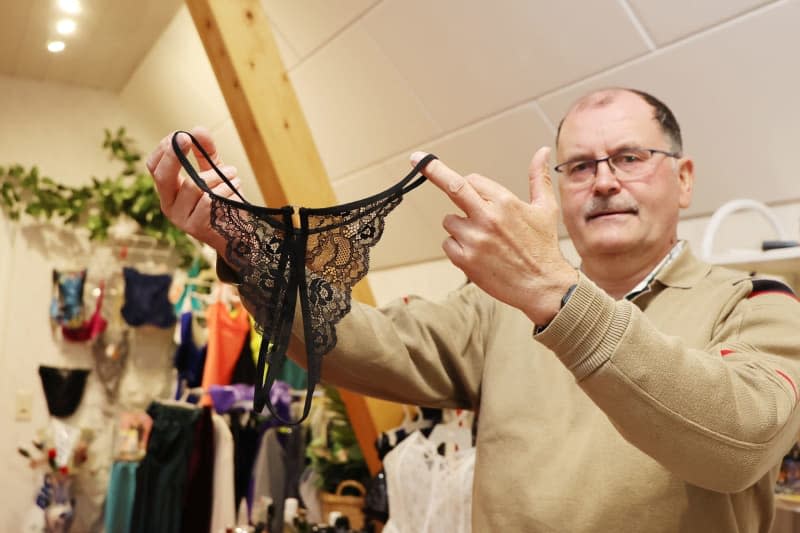The story of Andreas Weidhaas’ sex shop in the former German Democratic Republic (GDR) or East Germany reveals a lot about reunification, big money and decline.
But it also tells us a lot about life today in eastern Germany.
In the past, people talked about the “wild East.”
How has the region changed since Germany was reunified, are people in what became the eastern German states more uptight then they were back in the days of East Germany?
Weidhaas’s erotica shop opened in the small village of Oettersdorf in south-east Thuringia, not far from the border with Bavaria, in the mid-1990s.
He set up a mail-order business in the garage of his parents’ house together with a partner.
They a business licence for 17 East German marks and placed their first advertisement in the newspaper.
Big money in the early days
Right away, business boomed in a way that the 64-year-old still marvels at today. “People put 300, 400, 500 marks in the envelope and ordered things. We could practically wheel the money out of here in a wheelbarrow.”
All that money enabled him to fully renovate his house “and we didn’t need a loan.”
Eventually his garage was not big enough and the mail order business too costly, so he bought a disused customs station at the border, dismantled it and drove it home in parts using an East German Wartburg car.
He rebuilt it in his garden, creating the first brick and mortar sex shop in Oettersdorf.
The pair also staged lingerie shows in the community hall and presented dildos to the mayor in the city’s tent that was more often used for festivals, Weidhaas recounts with a grin.
Uta Bretschneider has heard lots of similar stories as director of the Forum of Contemporary History in Leipzig. She travelled through East Germany with historian Jens Schöne, interviewing sex shop owners about sex and desire in rural areas.
Sex shops were banned in the former East Germany, as was the distribution of pornography, she says.
After East and West were unified, people went through a great deal of trial and error, and made “a lot of new beginnings.”
Once Germany was united, people were allowed to be self-employed. Many hoped this new-found freedom would lead to big money. “After all, things were incredibly expensive back then, sometimes VHS tapes were sold for several hundred marks,” Bretschneider says.
Shame briefly forgotten
Curiosity led many to forget shame back then, she says. People openly rummaged through boxes of sexy VHS tapes. Today, customers view the offerings behind a closed door.
“It seems that in this spirit of optimism, the issue of discretion was somewhat ignored,” she recalls of the spirit at the time.
Shops sprang up in many rural regions, with some villages having two or even three. There is no official data about how many shops there were, but Bretschneider read there were once 1,800 shops in the eastern German states, a figure she says is realistic.
Now, there are still a few dozen owner-managed shops in the east – meaning the numbers are no different to those elsewhere in Germany.
There are no concrete figures on the loss of brick-and-mortar shops nationwide but industry representatives gathering data say the decline is partly due to online stores. Also, free streaming services reduce revenue from porn.
‘Better a loaf of bread than a dildo’
The decline of many eastern German sex shops was largely tied to the economy. After the brief phase of uninhibited curiosity, reality quickly set in. Unemployment soared and people saw few future prospects.
“Then people had to say to themselves: ‘I’d rather buy a loaf of bread than a dildo’.” Online shops led to a further phase of decline later on.
Those who stuck with the business did so out of a certain pragmatism, deciding, once you start something, you finish it, says Bretschneider.
But they could only do so if the business was run on their own property, and often with a sideline. Some shops were adjacent to amusement arcades, she says, while in Herzberg in Brandenburg, one person ran a sex shop and a fish store.
Weidhaas is no different. He has a spiral staircase and has a fur shop on the ground floor.
But the times when people dropped their inhibitions have passed, he says, and plans to wind down his business next year.
These days, three or four customers a week still come by, mostly older people, but sometimes also young people looking for a birthday present, Weidhaas says.
His bestseller is a standard vibrator. “We are provincial. The women here don’t want vibrators with 12 levels and three attachments.”
But many of them are actually interested in something completely different, he says.
“People just want to talk. They don’t have anyone to talk to about what they want.”


